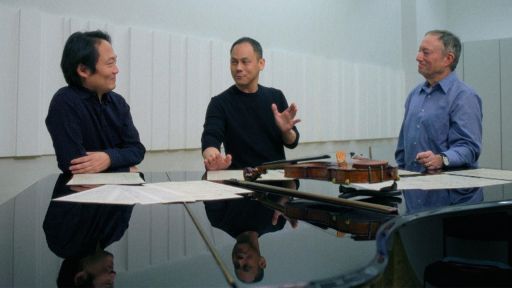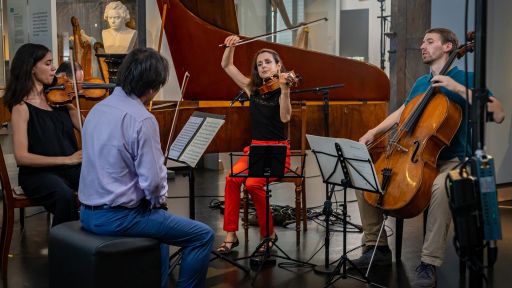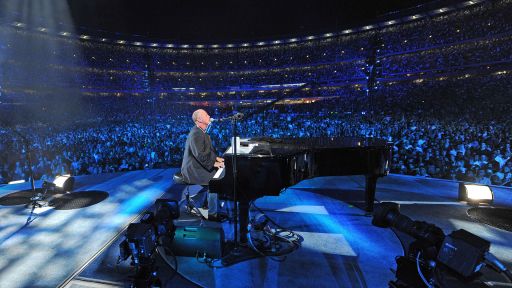Visit Germany, France and Scotland with host Scott Yoo as he investigates the connection between Robert Schumann’s creative genius and bipolar disorder with the help of the world’s only Juilliard-trained concert pianist, Schumann expert, and psychiatrist, Dr. Richard Kogan. Yoo also attempts to record the composer’s famed cello concerto and bring forth the emotion in Schumann’s writing with cellist Bion Tsang and the Royal Scottish National Orchestra. Traveling to France and Scotland, Yoo also meets with experts studying the mental struggles of other artists such as painter Vincent Van Gogh and poet Robert Burns at locations inspirational to them, such as Van Gogh’s Place du Forum featured in one of his paintings. In an exploration through the works and minds of these artists, Yoo shines a light on the significance of artistic expression.
Now Hear This “Schumann: Genius and Madness”
Visit Scotland, Germany and France with host Scott Yoo as he investigates the connection between Robert Schumann’s bipolar disorder and creative genius via experts, musical performances and examining the work of other artists outside world of music.
Features



♪♪ -Coming up on "Great Performances"...
I'm Scott Yoo.
Come with me to Scotland... Leipzig, Germany... -Cheers.
-...and the South of France to hear the hauntingly beautiful, at times otherworldly music of Robert Schumann.
♪♪ Schumann was misunderstood and unappreciated in his lifetime... -Chopin, for instance, he said that he did not even consider "Carnaval" to be music.
-...probably due in part to his mental illness.
♪♪ I'll explore the connection between mental health and creativity in Schumann and other artists... -Burns and Schumann actually have something else in common.
We think he was also probably bipolar.
-Mm.
-...to better understand their unconventional brilliance.
The bars, this is kind of a prison.
-I think we live in a very lucky time where mental illness is no longer a taboo.
In Vincent's day, there was a lot of, "Let's not talk about it."
-Hmm.
Next on "Now Hear This," "Schumann: Genius and Madness."
♪♪ Major funding for "Great Performances" is provided by... ...and by contributions to your PBS station from viewers like you.
Thank you.
[ Schumann's "Fantasiestuecke," Op.
73 playing ] ♪♪ ♪♪ -Today I'm in the French Pyrenees, with baritone Benjamin Appel at the Escaladieu Abbey.
♪♪ Here, cellist Edgar Moreau and pianist David Fray are rehearsing for David's festival, where they're playing the work of Robert Schumann.
♪♪ ♪♪ ♪♪ -What I find interesting with Schumann is the gestures are sometimes bigger, the phrases are bigger.
You have more freedom in a way.
♪♪ ♪♪ ♪♪ ♪♪ There is way more to really break out in a way of high emotions, peaks, but also in very, very dark moments and lows.
So it's all about this exchange of emotions, and that's what I find beautiful in Schumann.
-Let's go listen.
-Of course.
♪♪ ♪♪ ♪♪ ♪♪ -Like Schubert before him, Schumann began writing mostly for piano and voice, which translated later in his career to singing instrumental lines, especially for the cello.
♪♪ ♪♪ ♪♪ Fantastic.
-Thank you very much.
-When I listen to this music, even when the piano and the cello are together, they are not together.
There's a struggle, even though it's so smooth.
-You have this very lyrical way.
The cello part is very smooth, as you said.
But when you have this electricity, [speaks French] in a way... -Tension.
-...you can feel the complexity of the human, in general.
I mean, personally, it's very touching... -Yes, it is.
-...because of course, you have pain, but you have also a lot of light, and you have so many emotions, actually.
-And if I can add something, the very singular thing with Schumann is that you can skip from one emotion to the other in one or two notes, and in a very unexpected way.
And at the same time, it's very difficult, because this should never make you, as a musician, lose the global line and the structure.
Because it's not written like -- "People say he's crazy, so let's play..." No, you have to find this order that he was looking himself, despite this deep, complex nature that he had.
-So you're gonna sing something for us?
-I would love to.
-What are you gonna sing?
-David and I, we will perform the first song of his cycle, "Dichterliebe."
And it's the beginning of a love story, but has already the bitterness which shows us where this love story is going, and it's not ending well.
-Very Schumann.
-Very Schumann.
It's all kind -- Every aspect of life.
♪♪ ♪♪ ♪ Im wunderschoenen Monat Mai ♪ ♪ Als alle Knospen sprangen ♪ ♪ Da ist in meinem Herzen ♪ ♪ Die Liebe aufgegangen ♪ ♪♪ ♪♪ ♪ Im wunderschoenen Monat Mai ♪ ♪ Als alle Voegel sangen ♪ ♪ Da hab' ich ihr gestanden ♪ ♪ Mein Sehnen und Verlangen ♪ ♪♪ -I had heard Schumann had mental-health problems, and I wanted to know how that shaped his music.
So I went looking for the answer at the New York Academy of Medicine, in their antiquities library, with psychiatrist Dr. Richard Kogan.
Wow.
-This is a book from the early 1800s, "Neuroanatomy of the Brain."
Each copy had to be individually colored.
-I mean, obviously this is an anatomical drawing, but it's also a work of art.
I mean, it's incredible.
-Extraordinary detail.
Now, these two books are by German physician Dr. Johann Christian Reil.
He was the first person to coin the term "psychiatry."
Psychiatry literally means medical treatment of the soul.
-The soul!
-The soul, yes.
-That's cool.
-Now, Schumann, I've heard he had bipolar disorder?
-Interesting question because it's really difficult doing retrospective psychiatric diagnoses on historical figures.
I have enough difficulty getting it right with... -With live patients.
-...With live -- Exactly.
But Schumann wrote letters which really clearly lay out a sense of mania.
He said, "I feel so pressured.
I feel in a divine mood.
I'm so overflowing with sounds that if I could just have scribbled them all down, I would have composed 100 symphonies."
That sounds like a manic episode.
-Sure.
-There were also long stretches where he didn't compose at all, because when he was depressed, he not only had trouble concentrating, but he had diminished energy.
He felt hopeless, suicidal thoughts.
He had this delusional conviction that he was actually a worthless composer.
-He suffered.
-He suffered.
He suffered enormously.
He invented two imaginary companions to comfort him during times of stress.
He called them Eusebius and Florestan.
Eusebius -- a melancholic, introverted, poetic dreamer.
Florestan, by contrast, was an aggressive, impetuous, frenetic individual.
Probably not too much of a stretch to suggest that Eusebius represented the depressive side of Schumann's persona, and Florestan represented the manic side.
Now, the presence of imaginary companions is very common amongst children.
When grown-ups conjure up imaginary companions, it's either a sign of a very active imagination, or a warning sign that psychosis is imminent.
In Schumann's case, it was a sign of both.
-Wow.
[ Playing up-tempo classical piece ] ♪♪ ♪♪ Fortunately, there's a piano in the library's main hall because Richard is the only psychiatrist in the world who's a Schumann expert and a Juilliard-trained concert pianist.
-That is from a piece called "Florestan" from Schumann's piano suite "Carnival."
The whole piece, "Carnival," is based on a wildly imaginative premise.
He composed it when he was 25.
He was engaged to a woman named Ernestine.
Ernestine came from a town called Asch.
-Asch.
-Asch is spelled A-S-C-H. And Schumann noticed that those letters in Asch were also letters in his name, in the name Schumann.
They were the only four letters in his name that corresponded to musical notes.
This is A here.
And S in German is ES or E flat, so this is ES.
This is C. And H is the German counterpart to the note B.
So that's H here.
So Schumann played around with these letters, with these notes, A, S, C, H. A, S, C, H. And he came up with... [ Playing up-tempo piece ] He said, "Alright.
That's one thing I could do with the A-S-C-H." And he thought to himself, "Well, what else?"
A, S, C, H, and he invented... [ Playing up-tempo piece ] ♪♪ And he continued thinking to himself, "Well, A, S, C, H." And he came up with... [ Playing up-tempo piece ] -To take four kind of random notes... -Yeah.
-...and do that, that's unbelievable.
-It's certainly not how other people are composing music at this time.
His contemporaries thought the piece was incomprehensible.
Chopin, for instance, who was born in the same year as Schumann -- Chopin, the great Polish composer.
He said that he did not even consider "Carnival" to be music.
-[ Chuckling ] -Actually, let me share with you some of what contemporary music critics said -- "An affectation of originality, a superficial knowledge of art, the absence of true expression, and an infelicitous disdain of form has characterized every work of Robert Schumann.
They're uncouth, faded, and wanting in clearness."
Now, this would be neither the first nor the last time that a great piece of music was not immediately appreciated as such.
The imaginative leaps of the truly creative mind often take years -- sometimes even decades -- to be appreciated and enjoyed.
And I feel that it actually is important to understand Schumann's mind in order to appreciate his music.
Why don't we play Schumann's first violin sonata?
In characteristic Schumann fashion, he marks it "with passionate intensity."
-Sure, let's do it.
♪♪ ♪♪ ♪♪ ♪♪ ♪♪ ♪♪ This violin sonata was written toward the end of Schumann's career, when his mental health was deteriorating.
Around the same time, he wrote his famous cello concerto.
And it was actually the cello concerto that started my exploration into Schumann's mental state.
♪♪ ♪♪ Earlier in the year, I'd been hired to conduct a recording of the concerto with the Royal Scottish National Orchestra.
The producer was the legendary Michael Fine.
The soloist was my good friend Bion Tsang.
From the beginning, Bion wanted to get as close as possible to Schumann's intent when he wrote this piece.
-This past year has been a remarkable one.
Of all things, my wife's roommate from college, Josephine Knight, British cellist, she went back to the source, to the manuscript, and found out that a lot of the markings there, which are in pencil, were not Schumann's.
And so she cleared it all out and it's really incredibly revelatory, I think.
It changes the piece.
For example, if we were to take the opening... Scott, will play with me?
...this is how it went.
[ Playing notes intensely ] So this is what I'm used to hearing.
♪♪ And so you're thinking, this is... -Intense.
-...angry.
-Yeah.
-Angry music, right?
What's the real thing?
-Real thing... [ Softer music playing ] ♪♪ -So the real thing is a love song, which is consistent with the rest of the piece, because he wrote that bit in the second movement, with this kind of love duet.
-One of the things that I didn't even know -- the ending is completely different.
-I heard an old Casals recording.
They cut out, for me, the best part of the concerto... -That was common.
Even my own teachers, Aldo Parisot, Leonard Rose- -...and added their own music.
-They added their own music, yeah.
-But you have an entire generation that all said he was a brilliant guy, but he really wasn't a great orchestrator.
He didn't understand the instruments.
"And we're gonna help poor old Bobby Schumann, we're gonna fix his music up to make it palatable."
But if I look at the writing, it's so clear.
And somehow our age cares about what the composer said.
And as a composer myself, I find that incredibly endearing that performers care, that you want to get back to who this man was, this troubled, sad, tragic man who wrote this love song in 1850.
-Few composers had written cello concertos at the time, but Schumann loved the instrument.
Many think it represents his own mournful voice.
♪♪ ♪♪ Soloists often rehearse with the conductor playing the piano to sub in for the orchestra.
I don't play the piano, so I do it with a violin.
And when necessary, voice.
♪ Bom, bom, bom-bom-bom ♪ ♪ Bom, bom, bom-bom-bom ♪ ♪♪ ♪ Bom, bom, bom-bom-bom ♪ ♪ Bom, bom, bom-bom-bom ♪ ♪♪ ♪♪ ♪♪ When you think about developments of these concertos, usually that's where the action is.
-Yeah, well, if you think about Dvorák, probably the most famous cello concerto, right?
Where you... ♪♪ A lot of noodling, that ends up going into really virtuosic stuff.
-But here, I have the content and you have really nothing.
-Right.
What am I doing?
♪♪ ♪ Bom, bom, bom-bom-bom ♪ ♪ Bom, bom, bom-bom-bom ♪ He stripped all of the frills out of the music.
-Yeah.
-It's like he's...
It's reductionist composing.
-So I wonder what that says about what his life was like at that point, when he's composing this.
-Maybe he's in a real state of lack of confidence.
Apparently bipolar people tend to swing between really, wildly overconfident or they have no confidence at all.
-Very insecure.
-Right?
And he gave the score -- not some printed version, but the manuscript -- to somebody else.
"Hey, mark it up."
-Right.
-I mean, I'm no Schumann.
I would never do that.
-By this point, he had written a lot of vocal stuff.
Cello is more vocal than the violin, and maybe this was, like, his own personal way of speaking about his own life.
The second movement is this beautiful love song to his wife, conversation with his wife.
What's fascinating, though, is that before this was published, he wrote to the publisher, "This is quite a jolly piece."
I don't see it.
I mean, this...
It's kind of depressing.
And it makes you wonder, "Is that marketing?
Was he trying to sell the piece to Breitkopf & Haertel, you know, saying, 'Hey, you know, cello's a -- it's a fun instrument!'"
-It may not be fun-fun, but it's great.
-Oh, it's an amazing piece.
Yeah.
-You want to keep going?
-Okay.
-We'll just right there.
♪♪ The next day, we were ready for a sound check.
♪♪ ♪♪ ♪♪ ♪♪ ♪♪ ♪♪ I've conducted this piece many times, but stripping away the doctoring of earlier editions to reveal Schumann's true voice was already making it more cohesive.
♪♪ ♪♪ -Bravo, thank you.
You sound great.
The room sounds great.
Bion, superlative.
I read this score.
It sounds completely fresh and different.
-More lyrical.
-It's gonna be a great recording.
-Thank you.
-Can we hear the orchestra, the big tutti at letter A, please?
And then maybe we're ready to record.
Scott?
♪♪ ♪♪ ♪♪ ♪♪ ♪♪ Okay, sounds fantastic.
Let's go up and record this.
I'm going up to the booth.
Thank you, guys.
Bravo, Bion.
-To understand more of Schumann's story, Richard and the violist Charlotte Bonneton joined me in Leipzig, where Schumann spent his most productive years.
-There was an extraordinary concentration of musical talent here in Leipzig back in the 19th century.
I mean, Robert and Clara Schumann were here, of course.
But so were Felix Mendelssohn, Richard Wagner, Franz Liszt.
Amazing.
-Berlioz.
-Berlioz was here.
That's right, yes.
-Can you imagine if somehow Leipzig never existed, and all of those people never existed?
We wouldn't have jobs.
This whole field would not exist, practically.
I read that Schumann spent a lot of time drinking beers and smoking cigars in a place like this.
But, for me personally, he's still sort of a demigod, but he had a real life.
-His passions as a youngster were music and literature.
It was a twin passion, he planned a career in one or the other of the fields.
His mother was convinced that he wasn't talented enough.
She insisted that he apply to law school, and he did.
He was accepted here at the University of Leipzig to study law.
-And have a proper job.
-And have a proper job.
That's right.
-That's a story that happens today.
-Yes, unfortunately.
-All the time.
-It's interesting though, once he got to the University of Leipzig, he barely went to any law-school classes.
He grew up in a small town.
He was immediately seduced by the cultural opportunities here in this big city.
Actually, one of the things that happened right away when he got to Leipzig was he met a man named Friedrich Wieck, piano teacher, whose probably chief claim to fame even then, was that he was the father and sole piano instructor of the brilliant young virtuoso pianist Clara Wieck.
-That's how he met his future wife.
-That's how he met his future wife, yes.
-And when did they marry?
-Actually, it's an interesting story.
He was 30, she was 21.
-Not yet.
She was one day shy of 21.
-That's right.
-She could legally marry at 21... -She didn't need his permission.
-...without permission.
At 21.
When Clara's father found out, he was so infuriated, he said, "Well, the next seven years of concert fees, I'm gonna impound them."
-He did that?
-No, he sued for that.
-It was a bitter, bitter court battle.
Mr. Wieck, one of the things he said was that Schumann would never be able to earn a living and support a family.
Another point he made was that Schumann -- we're here in a beer garden -- he said Schumann is an alcoholic.
He has a problem with excessive drinking.
He said he's mentally ill. And he also said his ability as a composer, he's a mediocrity.
"My daughter is about to become the world's greatest pianist.
They are terribly mismatched, and Schumann's not worthy."
-Wow.
He was incredibly wrong.
-He was incredibly wrong.
Clara knew it.
-It's hard to imagine Schumann being mediocre for us.
-Yes, but he was not as well respected during his lifetime.
Part of the reason that he's ascended to the pantheon of the great composers is because his wife, Clara, outlived him by 40 years and played the music of Schumann for audiences really all over.
-Danke schoen.
-Thank you.
-Cheers.
-Cheers.
-The support of Clara, and the few others who believed in him, made a vital difference in Schumann's life.
[ Instruments tuning ] It's thought he wrote the second movement of this concerto for her, a duet for two cellos.
But many performers didn't trust that vision for the concerto, and instead played it with the entire cello section.
Michael wanted to hear the difference.
-Alright, ladies and gentlemen, let's hear the opening of the second movement with the entire cello section.
Cello section, think of yourselves as a group of soloists.
And when Bion makes a crescendo, plays louder, you shadow his dynamics.
So it's still a conversation between cellos and cello.
This is going to be take number?
-Take one eight one.
-Thank you very much.
♪♪ ♪♪ ♪♪ ♪♪ ♪♪ Fantastic.
It's so warm and beautiful.
Let's hear the solo version.
-Sure.
-Take one eight two.
♪♪ ♪♪ ♪♪ ♪♪ ♪♪ -That was beautiful as well.
So much more intimate.
But we do need to pick one for the recording.
What do you guys think?
-I like that better.
I think to have the one-on-one is more appropriate.
I mean, he's speaking to his wife... -This was written at a time in Schumann's life when he's...
It's a time of great uncertainty and insecurity for him.
What he grabbed on to in his life was Clara, so having those two voices in tandem, in lockstep, is nice.
What do you think, Karen?
-It's lovely to hear it differently, but for me, it's best just with the two soloists.
It's much more sensitive.
-I agree.
Let's just record it this way.
Are you okay with that, Michael?
-Absolutely.
-Thanks, guys.
To find out more about the connection between great art and mental health, I went to talk to an expert in another field -- author Bernadette Murphy, who studies Vincent van Gogh.
It's amazing how many facets of Roman civilization still live with us today.
Government?
-Yeah, government.
Language.
In general, we live life like the Romans.
The only thing that we do differently is we just have computers... -Electricity.
-...and cars and electricity.
They lasted 1,200 years -- that's a pretty long time.
Should we go this way?
-Okay.
So why did van Gogh come to Arles in the first place?
-We don't really know, but he says when he arrives, he felt that his blood was circulating again, and he's absolutely stunned by the countryside, the trees in blossom.
But what's really amazing is what happens to him when he's here.
So you're in one of the most famous squares in Arles.
It's called the Place du Forum, and this is intimately linked in with Vincent van Gogh.
It really symbolizes something new that Vincent was doing in Arles -- his first night paintings.
Now, of course, it's impossible to paint at night.
Nobody's got electricity.
People thought he was crazy.
But then he came here to this square.
He came across town carrying his paints and easel, because this place had just got lighting, sulfur lighting, in this café.
And he paints "Café Terrace at Night" -- one of the most famous of van Gogh's paintings.
And you really see that high point of yellow that he achieved that year.
-So when he was here, how many paintings did he make?
-More or less one every other day, with paintings and drawings.
He just had this burst of creativity.
-Unbelievable.
-Yeah, it's really unbelievable.
-Sweet.
-Yeah.
-I heard that Schumann wrote all of his chamber music in one year.
-Wow.
-In another year, he wrote 140 songs.
This sounds like a manic episode for van Gogh.
-Well, that extreme creativity, you can say, is almost obsessive.
And certainly Vincent was obsessive.
A year when he literally went from being a simple painter into a remarkably mature artist.
Practically all the great paintings that anybody knows were done here.
But it was also a year that had troubles.
And towards the end of the year, he started to show manifestations of his psychiatric problems.
-Hmm.
[ Bee buzzing ] Van Gogh checked himself in to Saint-Paul de Mausole, an 11th-century cloister that had been turned into, and still is, a mental-health facility.
-His room was upstairs, and this was the scenery he looked out at.
But he's a troubled mind by this time.
And one of the really strange things that happens to Vincent when he's in Saint-Rémy is his painting style changes.
After his breakdown, everything gets more jagged, there's more activity and action.
Totally different.
-Do you feel that, as a historian, that perhaps van Gogh's mental illness affected or augmented his artistry in any way?
-I would have said personally, yes.
It's so simple to see when he's happy, when he's disturbed in his own artwork.
He left here, and two months later, he was dead.
He committed suicide.
-Wow.
♪♪ Of the hundreds of works van Gogh produced in Arles and here, he sold almost none in his lifetime.
His genius, too, went largely unrecognized.
♪♪ ♪♪ -Go this way.
♪♪ ♪♪ I've always found it really touching when you come into this tiny little room, overlooking the same scene all those years ago, for a whole year, day in, day out, painting what he could, when he could.
-The bars...
This is kind of a prison.
-You know, I think we live in a very lucky time where mental illness is no longer a taboo.
Whereas in Vincent's day, there was a lot of, "Let's not talk about it."
-Hmm.
This is kind of a sad end, though, to the life of a man who...
I mean, this is one of the most revered artists of humanity, and he spent most of his last year here.
-Yeah, but he still managed to create, and this is reality.
He's a very troubled human being, but he's a human being who found some outlet.
We can benefit from looking at his paintings today... -Mm-hmm.
-...in museums all over the world.
-Like van Gogh, Schumann was an outside-the-box thinker.
To demonstrate that, Richard took Charlotte and me, Valentino Worlitzsch, the principal cellist of the Gewandhaus Orchestra, and violinist Usha Kapoor, to the University of Leipzig Instrument Museum.
-Have any of you been here to this museum before?
-No.
-No.
-There are a lot of amazing historical instruments here, but I brought you here because I wanted you to see this special piano.
This is a piano made by piano manufacturer Johann Nepomuk Troendlin.
Mr. Troendlin was very well known to Robert and Clara Schumann, and also to Felix Mendelssohn.
They really liked his instruments.
Now, this piano was built in 1828.
It has not been restored or rebuilt, so it's very different from the pianos that we're accustomed to today.
For one thing, there aren't 88 keys on this piano.
There's several left off here in the bass, three.
And seven left off in the treble.
So there are 78 keys in the piano.
The central difference is on the inside, there's no cast-iron plate.
So the piano is considerably less resonant, more challenging to sustain sounds.
-Right.
-It looks very different inside.
-This would have been new for the time.
-Yes.
This is cutting-edge technology for the Schumanns, in a sense.
Another feature of it, I noticed as I tried it, is that the damper pedal... You hear it?
-It's so loud.
-It's quite noisy, so it's a challenge to play it.
It may even be more of a challenge to play with this piano.
This is the A.
Tell me what you think of it.
[ Plays note ] -Wow, it's low.
-Ooh, that's so low!
-Super low.
-It's almost painful for us.
[ Laughter ] -Would it be okay if I tried to play a few notes on it?
-Sure, yeah.
-I'm so interested in it.
♪♪ ♪♪ The sound is so beautiful.
But it's really, really hard to play, I have to admit.
-Valentino, you are a really impressive pianist for a cellist.
-Thank you.
-You know, it would be really nice if we could all play Schumann's quintet, because we could hear it the way Schumann heard it when he wrote it.
-Yes.
-Let's try it.
-Challenging.
Let's try it.
♪♪ ♪♪ ♪♪ ♪♪ ♪♪ ♪♪ ♪♪ ♪♪ ♪♪ ♪♪ ♪♪ -Boy, what a different experience it is to play this piece with that instrument.
-With that pitch.
-With that pitch, for sure.
I don't know about you guys, but, Richard, I was struggling, I was sort of craning my neck to hear you.
-I have to admit, I was struggling, too.
-I've always wondered, "Why did Schumann write it this way?"
I mean, so many of the piano lines are doubled.
But now you understand that this was necessary.
The piano is being amplified by people who can sustain their sound and make a bigger sound.
I think any of us can overpower this instrument.
-That's a very good point, Scott.
This is the first piece for this genre, for piano and string quartet.
All the giants in the past, the Mozarts, Haydns, Beethovens, they all wrote string quartets, of course.
They all wrote solo piano music.
But it never occurred to any of them to write for this combination.
He just thought differently from other people.
He had a unique imagination, and this quintet is a product of that imagination.
Once it was performed, I think it was immediately acknowledged as a masterpiece, and it established a template.
Many great composers after Schumann, you've -- -Brahms, Dvorák.
-Dvorák, yes.
Other ones?
-Elgar.
-Elgar.
-Fauré.
-Fauré, yes.
I think Shostakovich.
These were all iconic works.
But this was the first one.
Schumann established the genre.
-Hmm.
South of Glasgow, this craggy coast was the home and inspiration for Scotland's most celebrated writer, Robert Burns.
Oh, gosh, look at that.
-Proper old ruin, isn't it?
-Bion and I went there to meet Dr. Moira Hansen, who's studying the connection between mental health and creativity in Burns' work.
Oh, wow.
This is amazing!
-So here we are in the land of Robert Burns.
As you probably know, Burns, the national poet of Scotland, a lot of people know him because of his song "Auld Lang Syne."
But what a lot of people maybe don't realize is how important Burns is to the Romantic period.
He's what we would think of as a proto-romanticist.
Literature comes first in the late 18th century.
And then what we move through into the early 19th century is the musical Romantic movement where Schumann is situated.
-Composers are actually behind.
-The composers are behind, yeah.
I think part of what happens here is we see composers such as Haydn and Beethoven setting Burns' songs to music.
We even see Schumann doing the same.
Some of the compositions that he gifts his wife as a wedding gift include songs written by Burns.
So as well as both being great figures within the Romantic movement, Burns and Schumann actually have something else in common.
We think he was also probably bipolar.
-Hmm.
-For example, he writes here, "They have been six horrible weeks.
Anguish and low spirits have made me unfit to read, write, or think.
I have a hundred times wished that one could resign life."
-Mm.
-Oh, wow.
-That's how dark this period has been for him.
And we see again, similarly, December 1789, so the following year, "I'm groaning under the miseries of a diseased nervous system, the most essential to our happiness or the most productive of our misery."
Happiness and misery, we're seeing the two poles there.
-It's interesting that he sees it as a disease that's external to him.
He sees it as, "I have an affliction."
-Yes.
He then goes on to say in this same letter, in fact, "I am inclined to think that what are called nervous affections are, in fact, diseases of the mind."
And we start to see examples of this coming in his poetry.
"Oppressed with grief, oppressed with care, a burden more than I can bear, I set me down and sigh, 'Oh life, thou art a galling load, along a rough and weary road, to wretches such as I.'"
-Oh, man.
[ Laughs ] -You know?
But even poems like "Tam o'Shanter," he has in there the lines, "But pleasures are like poppies spread: you seize the flower, its bloom is shed; Or like the snow falls in the river -- a moment white, then melts forever.
Or like the rainbow's lovely form, is vanishing amid the storm."
So you have these really beautiful natural images that we would associate with happiness -- flowers and rainbows and snowflakes, you know?
But they all disappear.
That happiness is transient.
Burns knows that it doesn't matter how good he's feeling.
There are points in his life where that is gonna disappear.
-It's not gonna last.
-It's not gonna last, and he has no control.
But as well as just kind of introducing these ideas in his poems, I think that what he does is he actually uses his writing as therapy.
-Hmm.
-He uses it to make sense of what's going on and actually to write himself out of that process.
And I'm wondering about whether that's something you've thought about in relation to Schumann and his writing?
Because, as I was preparing and I was listening to the cello concerto, immediately what I thought of was a poem by Burns entitled "A Winter Night," which he writes as he's going into a depressive episode.
It's a poem with a similar three-part structure, and we see the final section is very short.
It's only eight lines long.
"I heard nae mair, for Chanticleer."
That's the cockerel who crows.
"I heard nae mair, for Chanticleer, shook off the pouthery snow, and hailed the morning with a cheer, a cottage-rousing crow."
You imagine the cockerel in the morning.
It's that kind of same thing that you get.
-Right.
-But in this poem, it comes very late.
-Yes.
-It's same in the cello concerto.
-It's very late.
-Oh, really?
-That then would mirror, perhaps, their perceptions of time -- time being very slow and dragging on when you're in these depressed moments.
But as you come out of it, time seems to normalize again.
-I'm wondering, when he was saying that this piece is joyous... Maybe in fact he really was joyous, coming out of all the dregs of depression.
So, I think we need to find some way to make it -- make it so in this recording.
♪♪ ♪♪ ♪♪ ♪♪ ♪♪ ♪♪ ♪♪ ♪♪ ♪♪ -This is the home where Schumann lived as a newlywed, where he lived during his years in Leipzig.
-You're so lucky that you have places like this in your city.
-Yes, that's so true.
-It's pretty incredible.
-That's so nice.
-This is the very room where Robert and Clara Schumann would make music for each other.
They'd share their music, they'd share it with guests like Felix Mendelssohn.
-Having these three people in the room, it's really hard to imagine, isn't it?
-It's mind-boggling.
And I think these early years in Leipzig were among the happiest years of Schumann's life.
Maybe he had a premonition.
He had strong family history of mental illness.
He often talked about a fear of losing his mind, of going insane.
But I don't think that he knew what was in store for him.
I mean, a decade plus later, he would end up in an insane asylum and died there possibly of self-starvation, at age 46.
-Oh, that's too young.
-When I play or listen to Schumann's music, I always have to think of a passage from Goethe's "Faust" -- "Two souls, alas, are dwelling in my breast."
And Schumann, who, by the way, knew the entire "Faust" by heart, he also had to struggle with this inner conflict all the time of his life.
I think you can find it everywhere in his music.
-He certainly was a tormented soul.
But from his inner conflict, in a sense, we've all been gifted with the gorgeous music that he composed.
♪♪ ♪♪ ♪♪ ♪♪ ♪♪ ♪♪ ♪♪ -Of all the chamber music by all the composers, this piano quartet by Schumann may be my personal favorite.
For a man who many thought was so wrong, it shows how very right he could be.
♪♪ ♪♪ ♪♪ Of course, artists of normal mental health also create brilliant work.
But many of our most visionary artists simply thought differently.
And it's their uncommon vision that opens our minds to new worlds.
♪♪ ♪♪ -To order "Now Hear This" on DVD, visit ShopPBS or call 1-800-PLAY-PBS.
This program is also available on Amazon Prime Video.
♪♪ To find out more, visit pbs.org/greatperformances, find us on Facebook, and follow us on Twitter.
♪♪ ♪♪ ♪♪ ♪♪
You May Also Like






